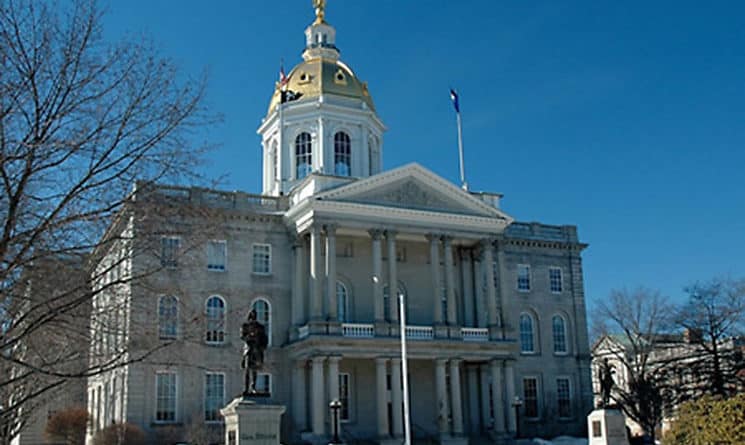House budget writers sent their version of the biennium budget to the Senate at the beginning of this month. Revenue projections for the biennium are often a sticking point between lawmakers and the governor, and this year is no different: House budget writers pegged revenues at $160 million less than Gov. Maggie Hassan’s projections. The House approved one of Hassan’s two new potential sources of revenue — allowing Keno in bars and restaurants — but rejected a 21-cent increase in the tobacco tax. The final House budget also included cuts to the Department of Health and Human Services, the Community College System, and the Department of Corrections. House members also approved transferring $1.3 million from the state’s Renewable Energy Fund, which is earmarked for encouraging development of alternative energy projects, and $9.9 million from the Rainy Day fund into the general fund.
The Senate will hear revenue presentations from state departments on April 28. But revenues may be even slimmer than anticipated. This session, Republican senators Jeb Bradley and Andy Sanborn proposed bills that would reduce two of the state’s business taxes.
SB 1 would reduce the business profits tax from 8.5 to 8.3 percent at the end of this year; from 8.3 to 8.1 percent in 2017, and from 8.1 to 7.9 percent in 2019. Meanwhile, a second bill, SB 2, would reduce the business enterprise tax from .75 to .725 percent at the end of this year; from .725 to .7 percent in 2017, and from .7 to .675 percent in 2019.
Reducing the taxes would cost the state $13.9 million in revenue each year in the 2016 and 2017 fiscal years, $27.7 million in 2018 and 2019, and $41.6 million in 2020 and 2021, according to the New Hampshire Fiscal Policy Institute (NHFPI).
The two tax cuts would make it “all but impossible to restore funding for local aid, services for the developmentally disabled, the state’s public colleges and universities, or a variety of other areas vital to New Hampshire’s high quality of life,” said Jeff McLynch, NHFPI’s executive director, in a statement.
Residents will have a chance to offer their testimony on the budget at an upcoming hearing. On Tuesday, May 5, the Senate Finance Committee will hold a public hearing on the budget in Representatives Hall at the Statehouse. Two sessions are scheduled from 3 to 5 p.m. and 6 to 8 p.m. The committee will hear testimony on the two budget bills, HB 1-A and HB 2. NH Voices of Faith, a group of residents from “multiple faith traditions,” will hold a vigil before the May 5 meeting. The group has been holding vigils outside various budget hearings this year and encouraging lawmakers to pass “humane budgets and humane policies.”
A community conversation on the budget sponsored by the New Hampshire Citizens Alliance will take place in Rochester on Wednesday, April 22 at 5:30 p.m. at the Rochester Public Library at 65 South Main St. McLynch will answer questions about the budget.
While the House resumes sessions on April 29, the Senate is still at work. On April 23, the Senate is set to vote on HB 407, Rep. J.R. Hoell’s (R-Dunbarton) bill to establish a study committee to look at the purchase of military vehicles and equipment by local police departments. The bill has changed much since it was initially introduced and now encompasses two ongoing debates in the state. Initially, the bill would have prohibited state and local police departments from purchasing military equipment, like the BearCat armored vehicle that Dover recently purchased. That prohibition was changed to a study committee, though, and a second study committee was added to the bill, this one charged with looking at procedures for “honorary legislation.” That change was the result of an earlier House hearing on a bill to designate the red-tailed hawk as the official state raptor. Among their criticisms, lawmakers said the House considers too many bills about honorary designations.
The Senate will also vote on HB 411, a bill sponsored by Rep. Douglas Ley (D-Jaffrey) that would prohibit employers from paying workers with disabilities less than minimum wage. State law currently allows employers to pay employees with disabilities less than minimum wage; it also allows “sheltered workshops” — job training programs for people with disabilities — to pay less than minimum wage. The bill would prohibit both.
A full schedule of upcoming House and Senate meetings is available at gencourt.state.nh.us.

